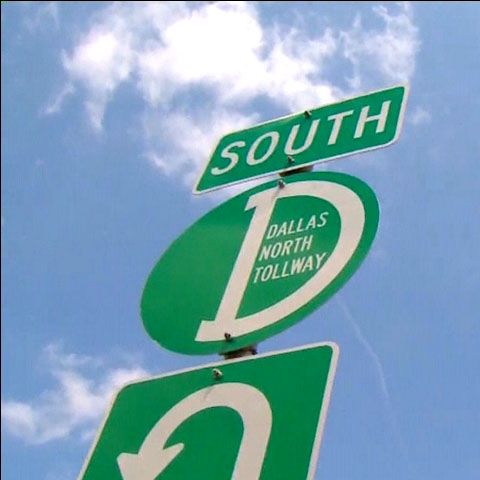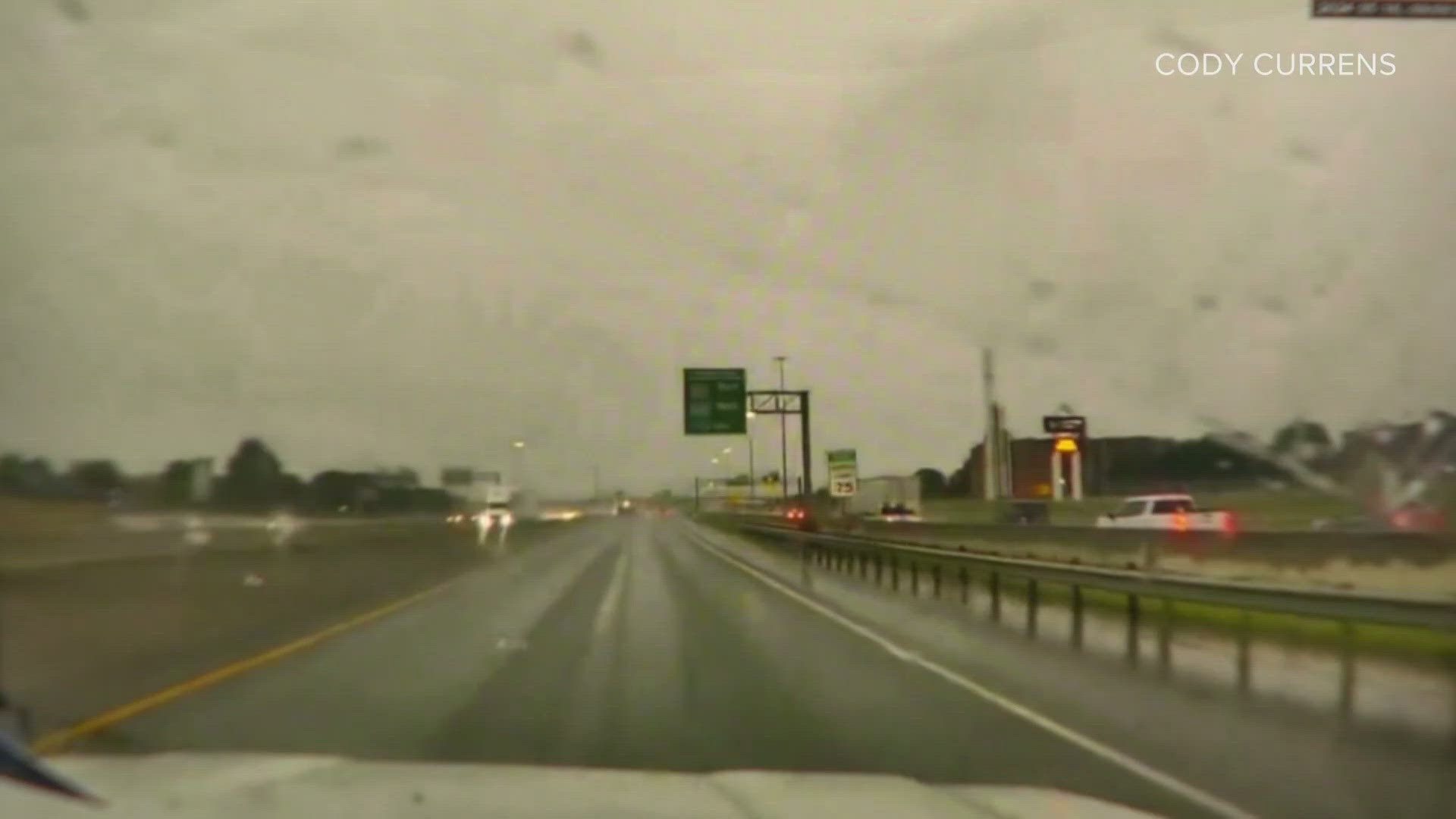The following article was originally published on WFAA.com and DallasNews.com on May 20, 2003.
Thirty-five years ago, area motorists got a speedy new option to travel between downtown and LBJ Freeway: the Dallas North Tollway.
Whether you were driving a Chevrolet Chevelle, Plymouth Road Runner or Mercury Parklane Brougham, 15 cents was all it cost to make the 10-mile trip along a route that once was part of the Cotton Belt railroad network.
The toll was 15 cents when the Dallas North Tollway opened in 1968. With the opening of this grand new thoroughfare came a promise that the tollbooths would one day be dismantled.
"When revenue bonds for a project are finally paid off ... the facility reverts to the state as part of its highway system, to be used free," J.H. (Jack) Davis, engineer-manager of the Texas Turnpike Authority, proclaimed in 1968.
That's exactly what happened with Interstate 30, the road now known as the Tom Landry Highway linking Dallas and Fort Worth. It started out as the Dallas-Fort Worth Turnpike, a toll road, but became a freeway when it was paid for in 1977.
Free rides on the Dallas North Tollway had been penciled in for Jan. 1, 2005, when the last bond payment was due on the original $33.65 million construction cost.
Much has changed since that road opened for business. Today, no portion of the Dallas North Tollway is debt-free, and the total system debt "is not scheduled to be fully retired until 2038," said Jerry Hiebert, executive director of the North Texas Tollway Authority, in a statement prepared to respond to questions from DallasNews.com.
The tollway since has seen two major extensions from its original end point at LBJ Freeway and now stretches about 20 miles to Texas 121 in Plano.
Today, a driver drops in 75 cents at each of three toll plazas if he doesn't have a toll tag that allows him to zip through at a discount. The entire trip costs $2.25 for cash customers, $1.80 for toll tag users.
The North Texas Tollway Authority has run the region's admission-only highways since it was created in 1997 to take over from the Texas Turnpike Authority. In addition to the tollway, the authority has built the Mountain Creek Lake Bridge in southwestern Dallas County, a tunnel under Addison Airport, and the President George Bush Turnpike. The Bush Turnpike, when finished in 2006, will offer a 30-mile link between Garland and Dallas/Fort Worth International Airport.
With almost 280 million tollbooth transactions last year, the North Texas Tollway Authority collected some $157 million from users of the tollway and the turnpike.
The prospect of a "free" toll road is a long way down the highway.
"It was kind of a change in philosophy," explained Donna Huerta, community affairs director for the North Texas Tollway Authority.
"We're still going to be building other projects in the region, so once those bonds are paid off, then the funds that continue ... are put back into the entire Dallas North Tollway system to build other roads, to provide operation and maintenance and to build capital improvements," Ms. Huerta said.
The philosophical shift came in 1982, Mr. Hiebert said, when the Texas Turnpike Authority revised its contract with its bondholders, known as the trust indenture. Feasibility studies indicated that the proposed extension of the Dallas North Tollway could be financed only if tolls on the completed portion were pledged to repay newly issued bonds, he said.
Mr. Hiebert noted that in 1991, the state Legislature authorized the tollway authority to use "surplus revenues" from one project to support another.
"We believe that a fully open and public discussion has been undertaken at each step along the 20-year process leading to the NTTA's current system-financing authority," Mr. Hiebert said.
Still, the distinction is lost on many motorists.
"Isn't it already paid for?" asked Tammie Bartlette of Dallas.
Ms. Bartlette, who uses the tollway and the Bush Turnpike during rush hour every day, estimates that tolls pinch her budget by $120 a month.
According to a DallasNews.com study using published fares with calculated mileage, traveling one mile on the tollway or turnpike costs about 10.7 cents for cash customers today. That put Dallas in the middle of a representative sampling of urban toll roads.
Drivers like Ms. Bartlette who use a toll tag pay about 8.6 cents per mile, based on the DallasNews.com calculations.
Highway officials in other states, however, portray the 11 cents-per-mile cost on the Dallas North Tollway as one of the most expensive in the country.
Wilbur Smith Associates, a consulting firm that also works for the NTTA, created a presentation for the Illinois State Toll Authority last year ranking the Dallas North Tollway No. 3 on a chart listing 14 major toll facilities across the nation.
A similar comparison chart prepared in 2001 by the Indiana Department of Transportation in 2001 had Dallas' tolls atop the list of 13 U.S. toll roads.
Ms. Huerta said an internal study, also done by Wilbur Smith, put the Dallas North Tollway system rate at 11.8 cents per mile for cash customers (a figure that incorporates the agency's other two toll facilities, the Addison tunnel and the bridge). The NTTA study listed five other urban toll roads that charge higher per-mile fees, including the Sam Houston Tollway in Houston (12.4 cents), the E-470 Beltway in Denver (18.1 cents) and the Eastern Transportation Corridor in Orange County, Calif. (22.2 cents).
"Let me dispel the misinformation you had about us being the highest," Ms. Huerta said. "We fall right in the middle."
Ms. Huerta said the tollway authority has no plans to raise the tariff on any of its routes, even though user surveys show motorists here would be willing to spend up to 22 cents per mile -- about $1.50 at each toll plaza.
"They're really getting a bargain, because we're only at 11.8" cents per mile, she said. "If we did charge too much, (customers) would just disappear, and we don't want that."
Motorist Donald Scaccia compares Dallas' rates unfavorably with the Garden State Parkway in his home state of New Jersey, where the cash fee is about 2 cents per mile. The New Jersey Turnpike comes in at 5.7 cents per mile.
But Mr. Scaccia said he uses the tollway here to save time, not money. "For the little bit you go, when you put 75 cents, they have a captive audience," he said. "That's the fastest way to get there -- unfortunately."
Actually, even some folks in New Jersey believe they're getting a raw deal.
Ray Neveil is the founder of Citizens Against Tolls, which has been battling to shut down the tollbooths on the Garden State Parkway. He argues that toll roads foster bureaucracy and suggests that gasoline taxes are a more efficient way to fund highway construction and maintenance.
"It was supposed to be paid for and the tolls removed in 20 years. It's 50 years and it hasn't happened," Mr. Neveil said. "Unfortunately, it's like Nixon says, the 'silent majority.' A lot of people are against tolls, but they don't really want to rally around the flag."
Over the years, North Texas motorists and politicians have grumbled about tollway price hikes, but there appears to be no organized effort to make all or part of it a free highway.
Dr. Jianling Li, an assistant professor at the University of Texas at Arlington School of Urban and Public Affairs, is helping the Texas Department of Transportation study how to meet growing transportation needs in the state.
Dr. Li advocates a toll-based highway system as the best way to expand a road network, saying the money collected will continue to cover maintenance costs after the construction expenses are paid off.
"It is a better way than a fuel tax," she said.
The tollway authority agrees. It is pushing ahead with a northward expansion from Texas 121 in Plano to U.S. 380.
"We've got a four-county commitment here with Dallas, Tarrant, Denton and Collin counties," Ms. Huerta said. "We're even starting to work on some toll projects in Fort Worth."


